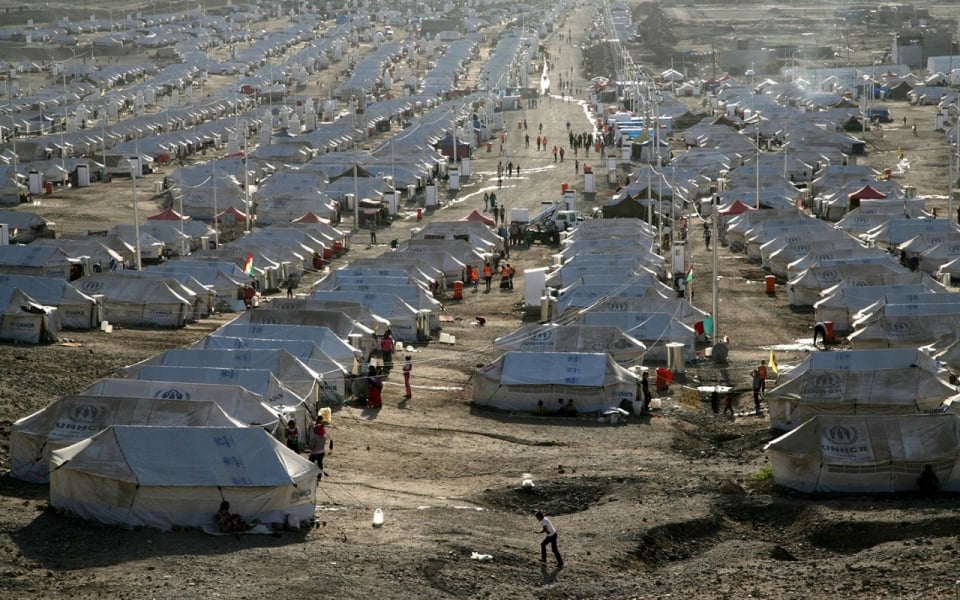
Safin Hamed/AFP/Getty Images
In the wake of the Paris attacks, American politicians of all stripes are rushing to burnish their security credentials. In their proposals they are undermining the one measure that might exhibit America’s basic motives in Syria, while adding nothing to U.S. security. House bill 4038, imposing extra screenings on Syrian refugees, and calls by governors, including at least one Democrat, to deny them entry, ignore what refugees are.
Of course we must be vigilant against terrorism. Many measures aimed at border security, some very uncomfortable, may well prove necessary. But the politicians are aiming at exactly the wrong target. They need to recall certain facts.
First, a widely overlooked point: “refugee” has a very specific meaning in law and administrative practice, distinct from other types of migrant. The UN formally defines refugees as persons fleeing persecution, which is the necessary condition even to consider anyone for U..S refugee status. The Paris attackers were not refugees; they already lived in Europe. Several travelled to and from the Middle East, but only one attacker seems even to have moved along current refugee routes.
Second, fear that terrorists could infiltrate the refugee system is understandable for anyone unfamiliar with the U.S. process. But our existing system has multiple layers of monitoring and support, in effective, long-established practices. As noted by Ambassador Ryan Crocker in the Wall Street Journal, multiple agencies, including Homeland Security and the FBI, vet all refugee candidates under consideration. A U.S. diplomat, with experience processing Middle Eastern refugees, corroborates to me that every case undergoes a multi-phased examination before gaining refugee status.
Third, even before embarking for the U.S., refugees are connected to a resettlement organization, from one of several, long-established networks. These organizations, including my friends at the International Institute of Connecticut, work closely with incoming families and individuals. Agency staff implements the rigorous State Department-funded refugee resettlement program. Volunteers mentor each family, visiting regularly to aid in their settlement. It is a service rather than security monitoring, but the relationship keeps citizens of the local community in touch with resettling refugees.
Fourth, America does not have the communities of disaffected Middle Eastern immigrants that a terrorist needs, to build networks to plan, equip, stage, and launch attacks. Europe’s large populations of alienated Muslims are not present here, and our resettlement agencies do not dump new arrivals in any shadow-lands.
The terrorism risk posed by refugees, even specifically from Syria and Iraq, is effectively zero. Yes, rapid expansion could strain a network geared to earlier levels of activity; this would explain in part the small number of Syrian refugees—10,000—that the administration proposed to accept this fall. Large increases should be carefully planned and rigorously monitored. But to worry about radicals posing as Syrian refugees is to ignore the meaning of “refugee.”
Beyond the question of domestic security, Syria itself gives us very few pieces on which to build a palatable U.S. policy. The only real forces are ISIS and the Assad regime —which started a civil war in response to the Arab Spring. Two approaches are raised in our public discourse. The first is to establish a safe haven in Syria for Assad’s non-ISIS opponents. This keeps our hands unsullied, but requires collaboration with countries of many different stripes, and will have little direct effect on either ISIS or Assad. The second is to join pro-Assad Russia in an anti-ISIS coalition; aside from the difficulties highlighted by Turkey’s shoot-down of a Russian plane, the moral compromise here is clear.
If we must choose among such options, we will need somehow to assert a basic moral context around what will be a pragmatic choice. Islamist terrorists voice an anti-Liberal, anti-Western narrative calling us amoral and imperialistic. Choosing an evil that we calculate to be the lesser, without somehow exhibiting our overarching moral values, will help our enemies, “proving” their narrative for them.
Taking in refugees is a long standing sign of America’s best nature. The system is one of the functions in the U.S. government that has been managed, quietly and collaboratively between Congress and State, for years. Through long practice it meets the standard of responsible handling in all respects, including security.
Everyone is entitled to their concerns—fear is a response to danger. Some will still worry about refugees, even if they understand that our process already eliminates the risks. Exactly to the extent that we still carry this fear, taking in Syrians who cannot abide either ISIS or Assad becomes an act of courage, undertaken out of conviction in our values.